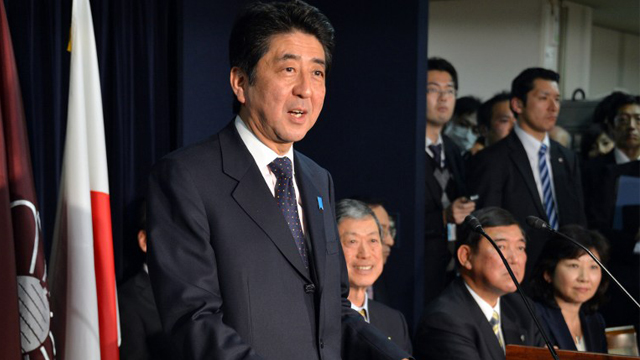SUMMARY
This is AI generated summarization, which may have errors. For context, always refer to the full article.

TOKYO, Japan — Prime Minister Shinzo Abe said Monday, March 4, Tokyo could be an inspiration for other cities if it wins the right to host the 2020 Olympics, after becoming the first place in Asia to get the Games in 1964.
Promising his government’s “fullest” support for Tokyo’s new Olympic bid, Abe told inspectors from the International Olympic Committee (IOC) that hosting the Games was his “life-long dream”.
“Tokyo, 2020, will inspire many others, just as Tokyo did before in 1964,” the conservative premier said at a reception welcoming a 14-member team from the IOC evaluation commission.
The team, led by IOC vice president Craig Reedie of Britain, started four days of scrutinising Tokyo’s Olympic blueprint and inspecting existing and planned facilities for 2020.
‘Olympic spirit was same spirit which Japan grew to its height’
It will visit the other candidates, Madrid and Istanbul, later this month before drawing up a technical report on the three bids for the 101 IOC members who will vote to choose the 2020 host on September 7 in Buenos Aires.
Abe, a former archer who heads the national archery federation, said “the Olympic spirit was the same spirit with which Japan grew to its height”.
“And yet, in Asia, in 1964, Japan was a lone industrialiser and a lone democracy,” he said. “So for the Japanese, the Olympic spirit became a mission that we must help the rest of Asia to grow.”
“Soon, the questions we face now in Japan will be the same questions many others will face — like how best to rejuvenate an ageing society, how clean and clear you can keep your sky,” he said.
“That’s why the torch must come to Tokyo again.”
Compact and dynamic Olympics
Abe’s grandfather Nobusuke Kishi, who was prime minister himself from 1957-1960, also helped invite the 1964 Games to Tokyo when Asia started moving forward after World War II.
The IOC team, including six voting IOC members and several advisers, is tasked with checking “Candidature Files” submitted by the three cities in January on 14 themes including infrastructure, finance, logistics and political and public support.
Tokyo’s plan features a “compact” and “dynamic” Olympics based on its financial wealth and track record in hosting international sports events.
It also attempts to allay fears of damage from a big earthquake or radiation from the Fukushima nuclear disaster.
Tokyo is the only one among the three candidates that has ever hosted an Olympics.
The city lost out to Rio de Janeiro in the campaign for the 2016 Summer Games, with Rio now set to be the first ever South American Olympic host.
$1.4-billion, 80,000-seat stadium to be built
Japanese Olympic Committee president Tsunekazu Takeda has admitted there was a preference among IOC members to spread the Games to untested regions. Istanbul could become the first Olympic city with a predominantly Muslim population.
“It is wonderful to hold an Olympics in a new place as the Olympic symbol represents the five continents,” Takeda, an IOC member who also heads the Tokyo bid committee, told AFP in an interview last month.
But noting that London successfully hosted its third Olympics last year, he added: “It is also very important that a matured country holds a truly wonderful Olympics.”
According to Tokyo’s plan, four of the 37 venues will be for football matches and will be located well outside of Tokyo, including in Miyagi, a region still recovering from the March 2011 quake and tsunami disaster which sparked the Fukushima meltdowns.
Of the 33 other venues, 28 will be within eight kilometres (five miles) of a projected Olympic village by the sea.
One is a futuristic 80,000-seat stadium with a retractable roof to be built on the grounds of the National Stadium, the main 1964 Olympics venue, at an estimated cost of 130 billion yen ($1.4 billion). – Rappler.com
Add a comment
How does this make you feel?
There are no comments yet. Add your comment to start the conversation.